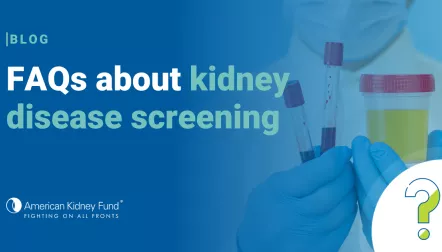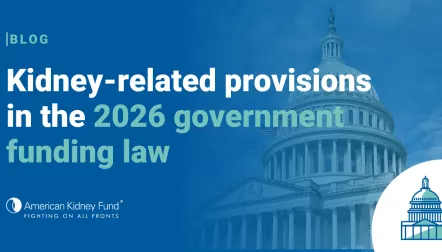
Blog post
Nine kidney disease research breakthroughs from 2023

2023 was a big year for the nephrology (kidney) research field. From developments in organ transplant options to a new understanding of kidney disease risk, it can be challenging to keep up with it all. Fortunately, the American Kidney Fund (AKF) has been keeping tabs on these headlines for you.
Here are nine of the biggest headlines from the nephrology research field from 2023.
Breakthrough #1: New atlas of human kidney cells to help unlock kidney disease research | National Institutes of Health (NIH)
In July, the National Institutes of Health (NIH) announced it had created a "comprehensive atlas of the human kidney." By comparing cells from healthy kidneys to those from diseased or injured kidneys, researchers created a "map" or model of the human kidney. This model was created as part of the Kidney Precision Medicine Project (KPMP) with support from NIH's National Institute of Diabetes and Digestive and Kidney Disease. The goal of precision medicine — and the kidney model — is to create new drugs and treatments that target the specific cause of a disease. Not all kidney diseases or acute kidney injuries affect the kidneys in the same way and this model will help scientists to better treat or prevent different types of kidney disease.
Breakthrough #2: Report redefines overlapping risks of heart and kidney diseases | American Heart Association
The American Heart Association (AHA) submitted a presidential advisory defining and officially declaring cardiovascular-kidney-metabolic (CKM) syndrome as a specific health condition. This condition acknowledges the overlap between cardiovascular (heart) disease, kidney disease, type 2 diabetes and obesity, breaking the condition into different stages with prevention and treatment guidelines for each stage. Find out more about what experts describe as a paradigm change in this AKF blog post.
Breakthrough #3: Feasibility of an implantable bioreactor for renal cell therapy using silicon nanopore membranes | Nature Communications
The Kidney Project — a national research project led by the University of California San Fransisco to create a bioartificial kidney — announced progress this year. The plan for the implantable device includes two key parts: (1) a bioreactor and (2) a hemofilter. The hemofilter will filter the blood to remove waste and toxins. However, the kidney performs other important functions for the body, too, including managing the level of certain hormones and reabsorbing water and other needed nutrients after the blood has been filtered. The bioreactor will perform these critical jobs, using a combination of kidney cells and silicone membranes. In August, the Kidney Project researchers published their findings that they had successfully implanted the bioreactor in healthy pigs. The next step would be FDA trials, first in animals and eventually in humans.
Breakthrough #4: Pig kidney works a record 2 months in donated body, raising hope for animal-human transplants | AP News
The University of Alabama at Birmingham (UAB) successfully transplanted a genetically modified pig kidney for the first time in August 2023, which functioned as a healthy human kidney would for the seven days of the study. The New York University (NYU) Langone Health hospital also transplanted a pig kidney into the body of a brain-dead man, Maurice "Mo" Miller, which survived for two months. This is the longest a pig kidney has functioned in a human body to date and scientists are hopeful this may mean they can eventually begin trials to transplant one into a living human.
Breakthrough #5: Global Coalition on Aging Finds Chronic Kidney Disease A Troubling Blind Spot Among Chronic Diseases in the US - Global Coalition On Aging
The Global Coalition on Aging (GCOA), the World's Leading Business Voice on Aging, conducted a survey of 1,000 Americans 18 years and older and discovered a surprising lack of awareness and understanding about chronic kidney disease. Despite the growing rate of kidney disease in U.S., over half of the participants (58%) had no awareness of the disease at all. Even respondents who regularly saw doctors did not have an awareness of the disease. GCOA recommended several steps to increase awareness, some of which AKF has already undertaken — including bringing stakeholders together to discuss concerns within the kidney community.
Breakthrough #6: Millions of lives and billions of dollars: the need for earlier intervention in chronic kidney disease (medicaleconomics.com)
As part of the Patient Access Initiative (PAI), AKF published a white paper called "Reimagining Kidney Care: From Crisis to Opportunity," that examines the dire kidney disease trends in the U.S. The paper also highlights the potential benefits of creating policies that prioritize "upstream care." Upstream care is an approach to health care that puts an emphasis on addressing the root of a medical problem rather than the symptoms. It focuses on earlier detection and intervention of a disease rather than treating it once it has become more advanced. The paper shows how this approach could have benefits for Americans' health and its economy. Find out more in this AKF blog post.
Breakthrough #7: New Non-Invasive Test Uses AI and Retinal Scans To Accurately Predict Risk of Chronic Kidney Disease | AP News
A new noninvasive retinal scan that uses an artificial intelligence (AI) deep learning algorithm called Reti-CKD "showed superior prediction of future CKD risk compared to the conventional [estimated glomerular filtration rate (eGFR)] or urine test." The test can accurately predict kidney disease risk because the kidneys and retina (the light-sensitive layer of eye tissue innermost in the eye and is an extension of the brain) have similar micro blood vessels. Concerns about the micro blood vessels in the retina, therefore, can be predictive of possible problems with the micro blood vessels in the kidneys, putting the person at greater risk for kidney disease.
Breakthrough #8: Risk Calculator for Early-Stage CKD May Soon Enter US Market (medscape.com)
Dr. Naveep Tangri, a nephrologist and professor at the University of Manitoba, is the founder of Klinrisk, Inc., a company that is developing and commercializing a new predictive tool for kidney disease called the Klinrisk model. Using 20 lab-measured variables from routinely ordered tests, it can predict the risk of an adult with early-stage CKD developing either a 40% or greater drop in eGFR or kidney failure. Since the Klinrisk model uses information from tests a primary care doctor may already give, Dr. Tangri says it is ready for any health system, insurance company or clinic to implement.
Breakthrough #9: Exercise during hemodialysis improved physical function of patients with kidney failure
A study found that, after 12 months, patients who participated in endurance and resistance exercises during their hemodialysis treatments had improved physical function compared to those receiving standard treatment. The study included 917 patients and found that those who did the exercises during dialysis also reported an improved quality of life and had fewer hospitalizations.
While there is no cure for kidney disease, there are ways to manage or treat it and 2023 had several exciting new developments in the advancement of drugs to treat kidney disease. These developments include FDA approvals for:
- A drug to slow down the decline of eGFR in people with kidney disease
- A phosphate absorption inhibitor drug
- The first fully-FDA-approved treatment for a rare kidney disease called IgA nephropathy
Furthermore, a study showed overwhelmingly positive results that the active ingredient in a diabetes treatment and a weight loss drug did not further damage the heart or kidneys. Advancements like these are critical to helping the millions of people living with kidney disease manage or slow down the progression of the disease, and hopefully avoid reaching kidney failure.
You can find more headlines from throughout the year on our Renal news round up page.
We hope to see even more progress in the kidney disease research and treatment space in 2024!





